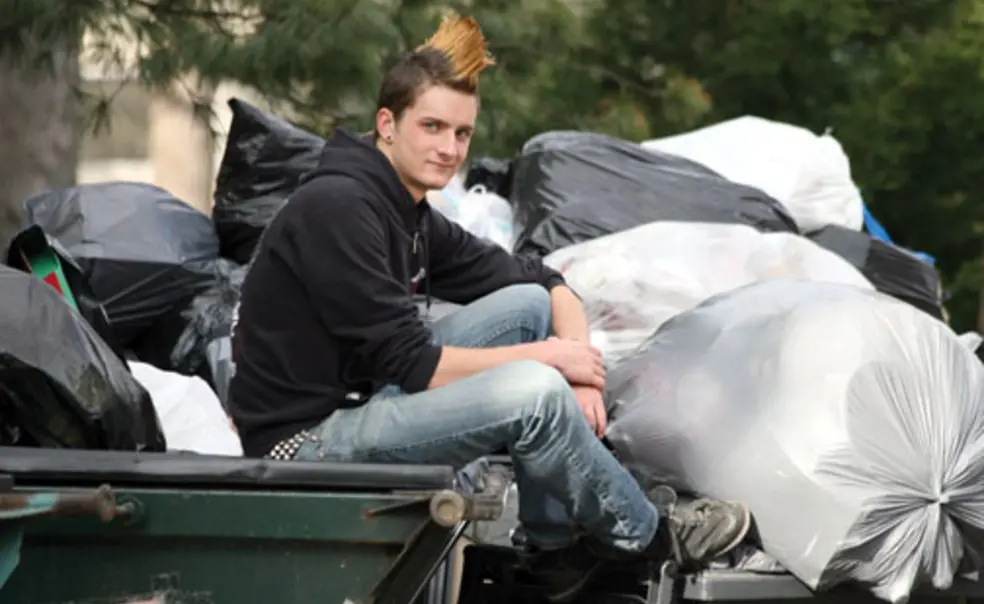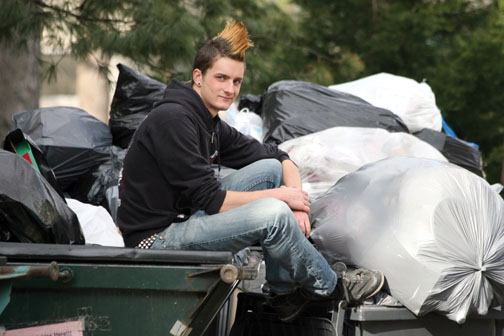Alex Barnard ’09 came to Princeton planning to major in the Woodrow Wilson School and get into politics. Instead, he chose sociology and got into Dumpsters.
Barnard, this year’s winner of the Daniel M. Sachs ’60 Scholarship, roots through trash by choice, not necessity. His junior and senior independent work on social movements focuses on “freegans,” people who reject consumer culture by boycotting it, or parts of it, and are looking for more eco-friendly ways to get what they need. That includes repairing discarded appliances, wearing secondhand clothing, and eating food discarded by grocery stores (mostly expired canned or boxed goods, but sometimes produce as well).
To understand the freegan movement and lifestyle, Barnard has taken a hands-on approach. You’d be surprised what one can find in a Dumpster, he says — boxes of pasta, bags of gourmet coffee beans, even designer jeans. Classmates who have joined him on scavenging excursions in New York City found it eye-opening. “I think that’s what the freegans are doing: They’re exposing our society to how wasteful it is,” he says.
At Princeton, Barnard has served as president of the Princeton University Band and engaged in social-justice projects that promote animal welfare and immigrant rights. He plans to study social and cultural anthropology at Oxford in the fall.
Barnard had an instant attraction to freeganism when he first read about it in a 2007 New York Times story. He had furnished his dorm room with discarded furniture, so in a way, he’d already become a freegan, without the label. But to turn his interest into viable academic work, Barnard had to view the movement through a sociological lens.
Freegans in New York have an ethos that taps into what Barnard calls “basic American values” such as thriftiness, self-reliance, and communal cooperation. In Brooklyn’s Bedford-Stuyvesant neighborhood, for instance, freegans run a bicycle workshop, recycling discarded parts and teaching kids how to build and repair their own bikes for free.
New York’s freegans have a diverse membership. Some in the community are devout anti-capitalists bent on starting a revolutionary movement, while others are middle-aged professionals hoping to reduce their carbon footprint. That feeds a natural tension: Should freeganism aim to overthrow the system or reform it? Barnard has his own thoughts on this, but he tries to keep a healthy distance from intragroup conflicts. His adviser, assistant professor Delia Baldassarri, says that he’s shown “a great capacity for maintaining the necessary distance from his research subject.”
Freeganism has become a media curiosity. In one week last year, three international camera crews visited Barnard’s freegan friends in New York, and a few members of the group flew to Chicago to appear on Oprah.
Seeing people in the world’s wealthiest nation voluntarily eating discarded food has a certain shock appeal, Barnard admits, but the news reports miss underlying social goals. Freegans aim to live more ethically in hopes of changing society and changing the way food is produced. The objective is to enable everyone to eat ethically, without having to dig in a Dumpster.













No responses yet